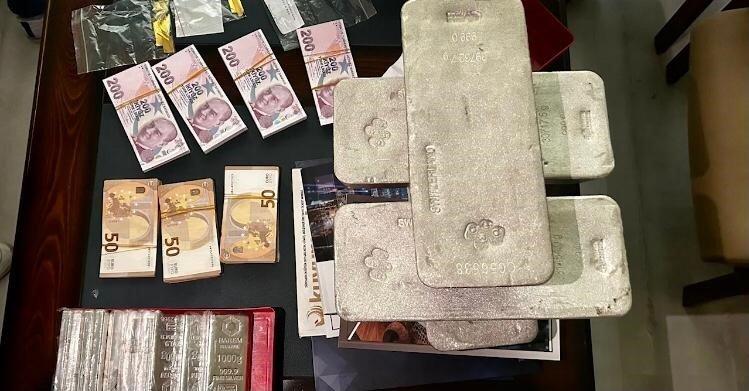
Turkish police’s operation uncovers Daesh financiers
Details of an operation against the terrorist group Daesh earlier this week revealed a widespread network of the group’s financiers.
Counterterrorism and intelligence units of the Turkish police nabbed 11 suspects in an Istanbul-based operation earlier, including those working/operating currency exchange offices and foreign trade companies.
The operation focused on the financial structure of the terrorist group and led to authorities freezing activities and assets of several companies and individuals.
The operation was the culmination of an investigation into companies funding Daesh in Syria and Iraq. It discovered that the terrorist group utilized cryptocurrency and a financial network in Türkiye.
The trail of money led authorities to currency exchange offices, import/export companies and international shipping companies in Istanbul.
Simultaneous operations in Istanbul’s seven districts ended up with capture of suspects accused of funnelling a significant amount of cash to the group.
Suspects were apprehended in 27 locations in city’s Bahçelievler, Bakırköy, Başakşehir, Çatalca, Fatih, Zeytinburnu and Şişli districts. Among them were A.R.A., a Turkish citizen of Syrian origin, his brother and his associate, other citizens and foreign nationals, and M.N.A. and M.A.H who run foreign trade and shipping companies.
A search of premises where the suspects were captured and/or worked at led to the seizure of digital evidence linking them to Daesh, as well as weapons, cryptocurrency cold wallets, several caches of gold and cash in the forms of dollars, Saudi riyals, UAE dirhams, Uzbek som, euros and Turkish liras.
Tax inspectors also investigated the companies and issued fines over tax irregularities.
The investigation shows that several companies helped accumulate cash for the group and sent it abroad through “hawala,” an informal system widely used in the Middle East, Asia and North Africa. It also shows that the money was transferred to Daesh camps in Syria. Suspects were using encrypted messages to avoid detection, according to authorities.
Ops against Daesh
Türkiye has been rounding up Daesh-linked suspects in ramped-up operations since the terrorist group attacked an Italian church in Istanbul in late January, killing one man during Sunday Mass.
Daesh operates a so-called Khorasan Province (Daesh-K) network in Türkiye, which looks for “new methods” and recruits more foreign members for its activities after constant counterterrorism operations became a “challenge,” security sources say.
The National Intelligence Organization (MIT) thwarted the terrorist group’s efforts for recruitment, obtaining funds and logistics support after its latest operation in the aftermath of the church shooting.
Daesh remains the second biggest threat of terrorism for Türkiye, which faces security risks from multiple terrorist groups and was one of the first countries to declare it as a terrorist group in 2013.
In December last year, Turkish security forces detained 32 suspects over alleged links with Daesh, who were planning attacks on churches and synagogues, as well as the Iraqi Embassy.
Daesh members have not previously targeted places of worship on Turkish soil, but they have carried out a string of attacks, including against a nightclub in Istanbul in 2017 that left 39 people dead and a 2015 bombing attack in Ankara that killed 109.
Terrorists from Daesh and other groups, such as the PKK and its Syrian wing, the YPG, rely on a network of members and supporters in Türkiye.
Turkish authorities have ordered the freezing of millions of lira worth of assets since 2013 to crack down on terrorism financiers in line with U.N. sanctions. Türkiye has increasingly been working to cut off and prevent the financing of terrorism, a pillar of the fight against terrorism worldwide.
In the past 11 years, it has frozen the assets of 1,918 individuals and organizations, according to official figures compiled by the Anadolu Agency (AA). These included 490 targets per U.N. sanctions, 96 targets per requests from other countries and 1,332 domestic targets between 2013 and 2024. Authorities found that of the 1,332 individuals and organizations targeted in Türkiye, 655 were linked to the Gülenist Terrorist Group (FETÖ), 275 were linked to the PKK, 259 to Daesh and al-Qaida, 11 to the Nusra Front and 132 to other terrorist organizations. Furthermore, authorities froze 1,086 immovable assets, 135 vehicles, two yachts and 162 companies, as well as TL 105,818,451 ($3,280,460), $2,781,123 and 339,463 euros ($368,541) in this period.
The U.N. Security Council passed sanctions for the fight against terrorism financing in 2001 to bolster international cooperation. Türkiye collaborates with many governments worldwide to target said financiers.
Ankara, working in tandem with Washington, agreed to freeze two separate assets in the past year, including one of a Daesh-related network, in January 2023. The crackdown is also part of Türkiye’s efforts to exit the Financial Action Task Force’s (FATF) grey list.
The watchdog said in February that Türkiye had “substantially completed” the steps for its removal from the list, praising its “high-level political commitment” to work with the force in October 2021 to strengthen the effectiveness of its Anti-Money Laundering (AML) and Counterfinancing Terrorism (CFT) systems.
In December last year, Turkish intelligence captured a top Daesh terrorist in charge of the terrorist group’s finances in the Damascus region in an operation in Türkiye’s southern Mersin province. Over $28,000, 14,950 euros, TL 31,800 and digital materials were confiscated in the operation targeting Hudhaifa al-Mouri, code-named “Ayyoub,” who was responsible for coordinating funds sent to Daesh members abroad.
Source » dailysabah.com





